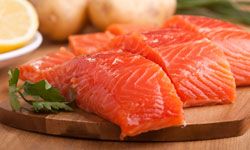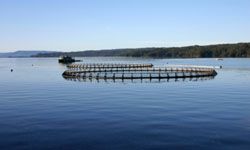The reason almost all Atlantic salmon comes from farms is that overfishing, pollution and the damming of rivers in North America and Europe have destroyed the salmon fisheries in the Atlantic. In fact, wild Atlantic salmon is currently on the endangered species list.
Compared to Pacific salmon, Atlantic salmon grow faster and respond better to crowded farming pens. Farmed Atlantic salmon is available anywhere year round for usually under $8 a pound. On the other hand, fresh wild Pacific salmon is only available between May and October. During the winter months, you'll have to purchase frozen Pacific salmon.
Even though farmed salmon is cheaper and more readily available than wild salmon, its production may pose threats to fish and the environment. There's always a threat that farmed Atlantic salmon will spread diseases to the wild salmon stocks that share the same waterways. Salmon farming pens can also become polluted due to overcrowding or decreased water circulation. This pollution can enter other bodies of water and contaminate wild populations of fish. Atlantic salmon can also spread sea lice beyond their pens.
However, despite these risks, the farming of salmon can benefit local communities. Salmon farms are typically found in rural areas, and their establishment of these farms helps boost struggling economies.
But which type of salmon is better for your health? Read about that on the next page.


